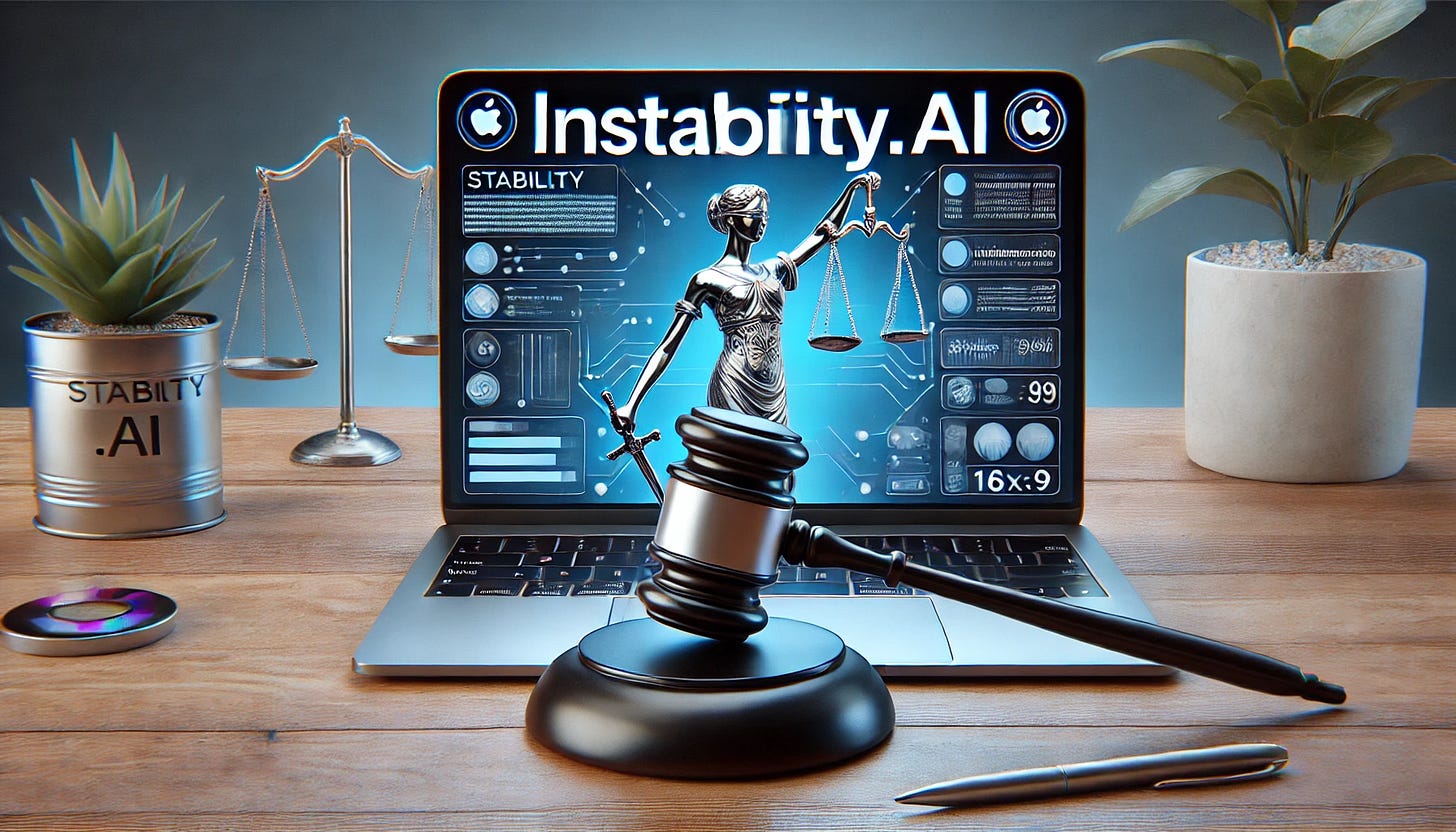InStability AI? Judge Rejects Its Attempt to Dismiss Key Copyright Infringement Case (& Opens Door to Liability for Integrating Infringing Tools of Others)
Federal Judge Just Made a Critical PRO-Copyright Owner Ruling in a Closely Followed Case That May Also Rattle Companies That Integrate Generative AI Models of Others
Welcome to your weekly genAI/media brAIn dump! This week, I get right to the point with “the mAIn event” - my headline story about a critical early court ruling by a California federal judge in a closely watched generative AI copyright infringement case (spoiler alert: Stability AI, one of the defendants, wasn’t too pleased about it). Then, we jump straight to “the AI case tracker” - updates on the key generative AI-focused copyright infringement cases. But first …
This week’s companion “the brAIn” podcast features my exclusive interview with Founder and CEO, Shara Senderoff, of “ethically trained” AI music generative service Jen Music AI. While music generative services Suno and Udio battle it out in court against the major labels (the topic of last week’s newsletter), Jen Music does it the old-fashioned way — actual licensing. Jen Music only trains its AI on music for which it pays compensation to participating, consenting artists
.
Listen to this week’s “the brAIn” podcast episode via this link. You can also find all episodes on all major podcast platforms. Please follow it, rate it, and share it. I record it myself (so you get my “flavor”). No AI/synthetic voices here!
And for those of you who would prefer to watch the actual interview with CEO Shara Senderoff of Jen Music AI, check it out here.
I. the mAIn event - California Judge Allows Copyright Plaintiffs’ Case to Move Forward (& Opens the Door to Liability for Integrating AI Tech of Others)
Last week, Judge William Orrick, the California federal judge presiding over a major generative AI “training” copyright infringement case, surprised many when he rejected Stability AI’s (and other defendants’) attempt to dismiss those infringement and related claims as a matter of law (via what is called a “Motion to Dismiss”). Previously, Judge Orrick didn’t seem to be particularly sympathetic to the plaintiff artists — whose works had been scraped without consent or compensation. Orrick’s ruling doesn’t mean that those artists win their case. But it means that they have pled a legally sufficient case and live to fight on. Now we move to the evidentiary part of the litigation.
Direct Infringing “Training” Is Not Necessary for Potential Copyright Liability
Here's what I find to be the most interesting part of Judge Orrick's ruling (and the one that hasn't received the attention it deserves). And it's important for any company that integrates generative AI technologyof others (like Stability AI) into its own tools. THE COURT ALSO OPENED THE DOOR TO POTENTIAL LIABILITY — the possibility of finding infringement against companies that build their own generative AI tool that integrates the infringing products of others. I've read the entire Court ruling (which you can find here) — and am an IP attorney by trade — so feel that I can convey the issues accurately.
Specifically, the Judge addressed whether the copyright infringement claims asserted against Stability AI’s co-defendant DeviantArt, Inc. could go forward (or instead, should be dismissed as a matter of law), when DeviantArt itself is NOT alleged to have trained any generative AI model itself (but instead is alleged "simply to have implemented and used the AI tools provided by Stability AI and others."). DeviantArt had argued that the infringement claims against it must be dismissed as a matter of law because it did not itself do the purportedly infringing training. In DeviantArt’s words, "holding it liable for that conduct would make the millions of third parties who have downloaded and implemented the AI products challenged in this case -- many of which are open source software -- liable for infringement, which is unsupportable."
Potential Liability on Both the “Input” & “Output” Sides - With No Substantial Similarity Needed
The Judge rejected DeviantArt’s argument to dismiss on BOTH the "input" and "output" sides of the equation -- allowing it to move forward to the evidentiary phase of the litigation. On the "input" side, in the Judge's words, "The actual operation of Stable Diffusion 1.4 and whether the amount of any plaintiff's copyrighted works in that program suffices for copyright infringement or a fair use defense concerning DeviantArt remains to be tested at summary judgment." And on the "output" side, the Judge wrote that whether DeviantArt's "Dream Up" software "operates in a way that could draw upon or otherwise reproduce plaintiffs' works to an extent that violates the Copyright Act and whether a fair use defense applies are issues that must be tested on an evidentiary basis" at the summary judgment phase.
Here’s another fascinating and critically important part of Judge Orrick’s ruling. He noted that claims made against genAI companies are utterly unique in the context of copyright law — and that a lack of “substantial similarity” on the “output” side of the equation does not end the issue. In his words, reliance on “run of the mill” substantial similarity copyright cases are “unhelpful in this case where the copyrighted works themselves are alleged to have not only been used to train the AI models but also invoked in their operation.”
The Ruling Opens the Door to Potential Widespread Legal Exposure - Including to Brands and Media & Entertainment Companies
Make no mistake. The court’s ruling — and there haven’t been too many rulings on these issues so far (so the early decisions have outsized impacts) — could cause a “chill” amongst other companies that have contemplated integrating the generative AI models of Stability AI or any other genAI company into their own services. In DeviantArt’s case, its generative AI tool — called “DreamUp” — gives users the ability to create their own art by selecting from its massive library of fully licensed art. Nonetheless, because DeviantArt’s underlying integrated generative AI model is from Stability AI — and Stability AI is alleged to have infringed copyrighted works on a massive scale in its training — that was enough for the Judge to reject DeviantArt’s motion to dismiss the direct copyright infringement claims asserted against it.
Think about that. This could impact any company and service that introduces a generative AI tool that integrates the underlying AI model of others, even if its tool only enables users to generate new works based on its own library of content and IP. That means agencies, brands, and media and entertainment companies, among others, could be directly impacted if they use or introduce new generative AI tools. Now, at least credibly, they too may be opening themselves to potential litigation and legal exposure for their integration of purportedly infringing generative AI services. And that kind of “friction” is not good for optimizing market adoption. I just recently wrote about the potential for related secondary liability for copyright infringement as well — you can find my earlier analysis here. Now copyright owners have some good early legal precedent to back them up.
There Is A Need for a New “Win-Win” AI Economy
So what’s a generative AI company to do to take away that “friction” in order to maximize adoption? Solve this legal risk by building a new AI economy and overall solution that give copyright owners fair compensation when their works are used for training. We’ve all identified this fundamental disconnect in the current generative AI economy. Now it’s time to move on to the next phase.
FIX IT!
(And that’s where I’m spending a significant chunk of my time these days. If you are intrigued by that statement — and are a media or entertainment company with significant copyrighted works (particularly video content) — reach out to me at peter@creativemedia.biz. Let’s talk.
III. the AI legal case tracker - updates on key AI litigation
I lay out the facts - and the latest developments - via this link to the “AI case tracker” tab on “the brAIn” website. You’ll get everything you need (including my detailed analysis of each case) of the cases listed below. Lots of legal AI-ctivity this past week! Generative music services Suno and Udio try their best in court to defend their relentless — and now officially conceded — unlicensed scraping of music. They just filed Answers to the major music labels’ lawsuits against them. But we know they’ll settle. Read more in my AI case tracker (which will also soon include an update on one of the Sarah Silverman court cases).
(1) The New York Times v. Microsoft & OpenAI
(2) UMG Recordings v. Suno
(3) UMG Recordings v. Uncharted Labs (d/b/a Udio)
(4) Universal Music Group, et al. v. Anthropic
(5) Sarah Silverman, et al. v. Meta (class action)
(6) Sarah Silverman v. OpenAI (class action)
(7) Getty Images v. Stability AI and Midjourney





